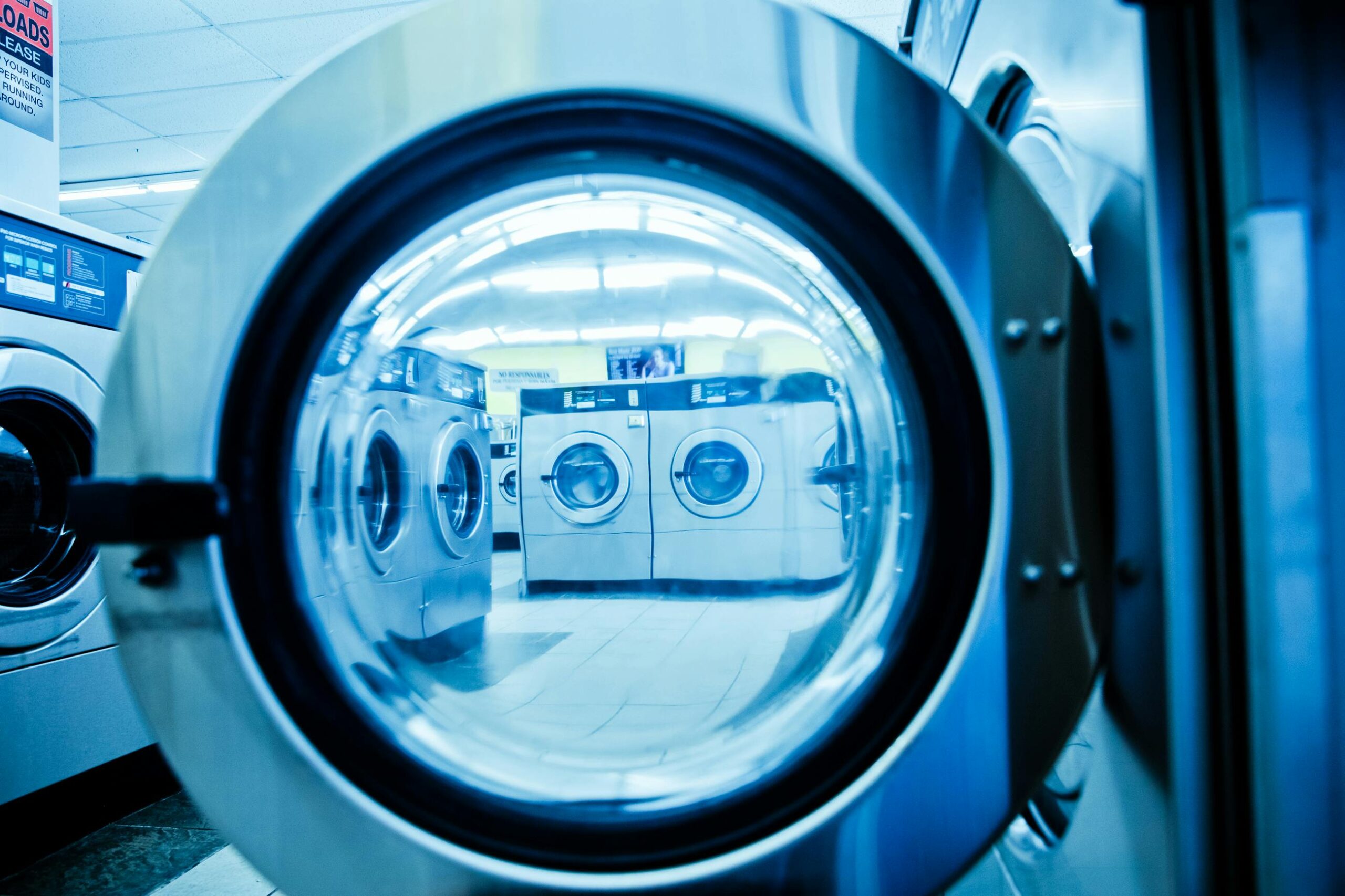Why Legal & Ethical Awareness at the Laundromat Matters
When visiting a laundromat, most people think only about getting their laundry clean. However, being aware of legal and ethical practices at the laundromat is just as important. Whether you’re a regular customer or a first-timer, understanding your role in a Legal & Ethical Laundromat environment can help you avoid conflicts, protect your belongings, and contribute to a respectful shared space.
What Does “Legal & Ethical” Mean in a Laundromat?
In the context of a laundromat, legal refers to following rules and laws—like not damaging machines, avoiding theft, or respecting posted policies. Ethical means behaving in a respectful and fair way toward others—like not hogging multiple machines or removing someone else’s laundry without permission.
Why Awareness Is Important
-
Prevents Legal Trouble:
Some laundromats have surveillance, and damage or theft can result in being banned—or even facing legal action. -
Builds Community Respect:
Shared spaces work best when everyone follows unspoken social rules. Being considerate makes the experience better for everyone. -
Protects Your Property:
Being aware of who’s around and following proper laundry timing ensures your clothes don’t get lost or tampered with.

Examples of Legal and Ethical Awareness in Action
-
Reading and Following Posted Rules
-
Not Leaving Laundry Unattended for Hours
-
Reporting Broken Machines Instead of Using Them Anyway
-
Being Mindful of Others Waiting for a Washer or Dryer
Image Suggestion: Use a checklist-style image with these bullet points to reinforce good habits visually.
Legal Responsibilities at the Laundromat
When using a public laundry facility, it’s important to remember that laundromats are shared, commercial spaces governed by rules. While many of these are posted as policies, there are also legal responsibilities that all users should be aware of. Understanding your duties within a Legal & Ethical Laundromat environment helps ensure a safe and respectful experience for everyone.
1. Respect Private Property
Laundromat machines, furniture, and other equipment are the property of the business owner. Damaging or misusing these items—even unintentionally—can result in legal consequences or financial liability.
Legal Responsibility:
Avoid overloading machines, tampering with settings, or forcing machine doors. If a machine isn’t working properly, notify staff rather than attempting DIY fixes.
2. Do Not Tamper with Others’ Laundry
Removing, handling, or taking another person’s laundry is not just rude—it can be considered theft or invasion of privacy.
Legal Responsibility:
You can’t legally touch or remove someone else’s laundry without their permission, even if their clothes are left sitting unattended.
3. Observe Time Limits and Posted Rules
Many laundromats have posted usage guidelines, including time limits for machines, folding areas, and seating. These aren’t just suggestions—they may be enforceable under the laundromat’s terms of service.
Legal Responsibility:
Using the space responsibly, avoiding loitering, and obeying posted time limits shows respect for other patrons and helps maintain legal order.
4. Dispose of Trash and Lint Properly
Leaving behind used dryer sheets, lint, or detergent spills isn’t only inconsiderate—it could violate health and safety codes.
Legal Responsibility:
Most laundromats require users to clean up after themselves. Repeated violations can lead to being barred from the premises.
5. Keep Children Supervised and Pets Out
Most laundromats have rules requiring children to be supervised and pets to stay outside (unless they are service animals). This helps avoid injury and legal issues.
Legal Responsibility:
As the adult present, you’re legally accountable for any damage or accidents caused by unsupervised minors or unauthorized pets.
Final Thoughts
Maintaining a Legal & Ethical Laundromat environment is everyone’s responsibility. Understanding and following the legal expectations ensures a smooth, stress-free visit for all customers. Treat the space—and others in it—with respect, and you’ll avoid unnecessary conflicts or consequences.
Ethical Practices at the Laundromat
Using a public laundry facility requires more than just knowing how to run a machine. Practicing good ethics helps maintain a Legal & Ethical Laundromat environment where all users feel respected, safe, and welcome. Here’s what you should keep in mind to ensure a responsible and courteous visit.
1. Share Machines Fairly
One of the most common issues at laundromats is the misuse of machines during busy hours.
Ethical Tip:
Avoid occupying multiple machines during peak times, especially if others are waiting. If you’re doing several loads, consider spreading them out or returning during off-peak hours.
2. Don’t Leave Laundry Unattended for Too Long
While it’s acceptable to step away briefly while your clothes wash or dry, leaving laundry unattended for extended periods is disrespectful to others waiting.
Ethical Tip:
Set a timer on your phone and return promptly to remove your clothes. This small habit helps everyone get their turn fairly.
3. Keep Noise and Distractions Low
Laundromats are shared public spaces. While some noise is expected, loud phone calls or playing music without headphones can disturb others.
Ethical Tip:
Use headphones for calls or entertainment and keep conversations at a moderate volume.
4. Clean Up After Yourself
Leaving behind spilled detergent, dryer lint, or garbage is inconsiderate and can create hazards for others.
Ethical Tip:
Always wipe down machines after use, throw away trash, and clean the lint trap if you’ve used the dryer.
5. Respect Others’ Belongings and Privacy
Never touch or move someone else’s laundry unless absolutely necessary—and never rummage through someone else’s load.
Ethical Tip:
If you must move someone’s laundry, do so gently and place it on a clean, designated surface. Better yet, wait a few minutes to see if they return.
6. Be Kind and Courteous
Simple acts of kindness—like helping someone lift a heavy load or holding the door—go a long way in creating a friendly laundromat atmosphere.
Ethical Tip:
Treat fellow customers and staff with respect. If a problem arises, address it calmly or notify management.
Final Thoughts
Maintaining a Legal & Ethical Laundromat isn’t just about following rules—it’s about being mindful of how your actions affect others. Whether you’re a first-time user or a regular, these ethical practices ensure a smoother experience for everyone. Courtesy, cleanliness, and consideration are the keys to sharing laundry spaces respectfully.
Avoiding Conflicts and Misunderstandings at the Laundromat
A Legal & Ethical Laundromat experience is not just about cleanliness and machine efficiency—it’s also about respecting shared space and avoiding unnecessary disputes. Here are practical steps you can take to prevent conflicts and ensure a stress-free visit for yourself and others.
1. Be Punctual with Your Laundry Loads
One of the most common sources of conflict arises when people leave their clothes in machines for too long.
Tip:
Set a timer on your phone and return promptly to remove your laundry once it’s done. This simple habit can prevent others from waiting too long or moving your clothes.
2. Never Touch Others’ Laundry Without Permission
Handling someone else’s laundry can feel intrusive and spark arguments.
Tip:
If you must move clothes (for example, if someone’s load is done and they’re not back yet), do so respectfully—use a clean surface and handle with care. It’s always better to wait a few minutes if you can.
3. Communicate Calmly and Respectfully
Misunderstandings happen, but how you react can either solve or escalate the situation.
Tip:
If someone cuts in line or uses your reserved machine, speak up calmly. Avoid shouting or accusatory language. Use “I” statements like “I was waiting for that machine.”
4. Follow Posted Rules and Etiquette
Every laundromat has its own rules—some may restrict food, pets, or large items.
Tip:
Read and follow all posted signs. This shows respect for the establishment and helps you avoid unintentional violations that could annoy others.
5. Don’t Hog Machines During Peak Hours
Overusing machines, especially when it’s busy, can frustrate others who are waiting.
Tip:
If you’re doing multiple loads, try to come during off-peak hours or leave space for others between cycles.
6. Respect Staff Instructions
Attendants are there to maintain order and assist with issues. Ignoring their guidance can lead to bigger problems.
Tip:
If you’re unsure about a rule or machine use, ask the staff. Being cooperative shows you’re contributing to a Legal & Ethical Laundromat environment.
Final Thoughts
Most laundromat conflicts can be avoided with basic respect, communication, and awareness. Practicing patience and observing social norms not only prevents misunderstandings but also promotes a Legal & Ethical Laundromat culture. The goal is simple: a shared space where everyone can do their laundry in peace.
Common Legal or Ethical Violations in Laundromats
A Legal & Ethical Laundromat functions best when patrons follow basic rules and moral standards. Unfortunately, many people unknowingly commit violations that can lead to conflicts, fines, or even legal trouble. Understanding these common legal and ethical missteps can help you avoid them and contribute to a respectful shared environment.
1. Leaving Laundry Unattended for Hours
Many laundromats have signs advising customers not to leave their laundry unattended for extended periods. Doing so may:
-
Block machines from others
-
Invite theft
-
Violate time-limit policies
2. Removing or Touching Others’ Laundry
Handling someone else’s clothes, even if a machine has finished, is one of the top ethical violations in laundromats. It can be considered:
-
A breach of personal boundaries
-
A trigger for verbal disputes
-
Grounds for ejection by staff
3. Overloading or Misusing Machines
Improper machine use can lead to:
-
Equipment damage
-
Overflow or leaks
-
Safety risks
Misusing machines not only affects laundromat operations but can also violate posted legal disclaimers.
4. Using Industrial Machines for Commercial Purposes Without Permission
Some customers bring large commercial loads—like linens from salons or small hotels—without informing the laundromat owner.
Why it’s an issue:
-
It violates most laundromat terms of service
-
Causes excessive wear on machines
-
Infringes on space and time for other customers
5. Vandalism and Property Damage
Purposely damaging machines, vending units, or other property is a serious legal offense.
Examples include:
-
Forcing open machines
-
Writing graffiti
-
Tampering with coin mechanisms
This behavior not only disrespects shared space but can also result in criminal charges.
6. Theft or Tampering with Belongings
Taking laundry that isn’t yours or going through someone’s clothes is both unethical and illegal.
-
Even small items like socks or towels count
-
Surveillance footage may be used to report theft
7. Ignoring COVID-19 or Public Health Guidelines
In recent years, some laundromats have posted hygiene protocols, such as mask-wearing or distancing.
Violations here may include:
-
Refusing to follow health safety rules
-
Using machines while sick
-
Leaving messes behind (e.g., used wipes or detergent spills)
Laundromat Policies: What You Need to Know
Understanding and following laundromat policies is essential for maintaining a Legal & Ethical Laundromat. Whether you’re a first-time visitor or a regular, knowing the rules can save time, prevent conflicts, and help keep the space safe and pleasant for everyone.
1. Machine Use Rules
Most laundromats have clear guidelines posted on or near washers and dryers. These include:
-
Do not overload machines
-
Use only approved detergents
-
Report malfunctions to staff immediately
Misusing machines can result in extra charges or even bans in strict laundromats.
2. Time Limits and Laundry Removal
Policies often outline how long clothes can remain in machines or on folding tables.
-
Leaving clothes unattended too long may result in removal
-
Some laundromats have a “30-minute pickup rule” after the cycle ends
These rules help maintain flow and ensure fairness.
3. Behavior Expectations
To maintain a Legal & Ethical Laundromat, customer behavior must align with respectful conduct. Common policies include:
-
No yelling, profanity, or harassment
-
No smoking or vaping
-
Respect others’ space and belongings
Violating these can lead to being asked to leave.
4. Children and Pets
Most laundromats have safety-based policies regarding children and animals:
-
Children must be supervised at all times
-
Service animals may be allowed, but pets typically are not
This is to ensure everyone’s safety and hygiene.”
5. Cleaning Up After Yourself
Part of being in a Legal & Ethical Laundromat is keeping the area clean:
-
Wipe down machines if you spill detergent
-
Throw away dryer sheets and lint
-
Don’t leave trash or personal items behind
This shows respect to other patrons and staff.
6. Payment and Refund Policies
Be sure to understand how the laundromat handles:
-
Coin-operated vs. card-based machines
-
Refunds for machine malfunctions
-
Prepaid loyalty cards or memberships
Some laundromats offer mobile app payments, while others still rely strictly on coins.
7. Surveillance and Security
Many laundromats include policies about video surveillance for safety purposes.
-
Cameras help monitor theft, vandalism, and rule violations
-
Signs typically indicate active monitoring
Conclusion on Laundromat Legal and Ethical Use
Using a Legal & Ethical Laundromat isn’t just about getting your clothes clean — it’s about contributing to a respectful, safe, and fair environment for all users. Whether you’re a frequent visitor or just starting out, understanding the legal responsibilities and practicing good ethics helps maintain a laundromat where everyone feels welcome.
Key takeaways include:
- Follow posted rules to avoid legal issues and machine misuse.
- Respect others’ time and belongings — don’t remove clothes prematurely or occupy machines too long.
- Maintain cleanliness for shared spaces.
- Practice ethical behavior by being courteous, honest, and considerate.
- Stay aware of common violations like tampering with machines, theft, or harassment.
Adhering to these principles ensures that the laundromat remains a smooth-running operation, free of unnecessary conflicts or violations. When everyone does their part, the space becomes more efficient and pleasant for the entire community.
Would you like help designing the infographic mentioned above or turning this into a shareable visual for social media or blog use?
FAQ on Laundromat Legal and Ethical Use
Understanding how to behave properly in a Legal & Ethical Laundromat can help you avoid common pitfalls and create a respectful experience for everyone. Below are answers to frequently asked questions that will help guide your next visit.
What are the basic legal rules at a laundromat?
Most laundromats require customers to:
- Use machines only for laundry purposes.
- Pay for all services (no tampering or bypassing coin mechanisms).
- Follow posted rules and operational hours.
Is it okay to remove someone’s clothes from a washer or dryer?
Ethically, no. You should wait at least 5–10 minutes after the cycle ends. If necessary, place their clothes in a clean laundry cart or designated folding area without damaging them.
Can I reserve multiple machines at once?
Using one machine at a time is most respectful. Holding up several machines can inconvenience others and is considered unethical in busy laundromats.
What should I do if someone is being disruptive or suspicious?
Notify the laundromat attendant or management. In a Legal & Ethical Laundromat, everyone is responsible for upholding a safe, civil space.
Are there any ethical tips for using shared machines?
Yes! Some key practices include:
- Wiping machines after use.
- Not overloading machines.
- Not using excessive detergent that can damage machines.
Is it legal to bring pets or children into the laundromat?
This depends on local regulations and individual laundromat policies. Generally:
- Service animals are permitted.
- Children should be supervised at all times.
What are common legal or ethical violations?
Some examples include:
- Theft of clothing or detergent.
- Harassment of other customers.
- Leaving trash behind.
- Tampering with vending or laundry machines.
Final Thoughts
By understanding the basics of Legal & Ethical Laundromat behavior, you’re contributing to a clean, peaceful, and functional space for all users.





